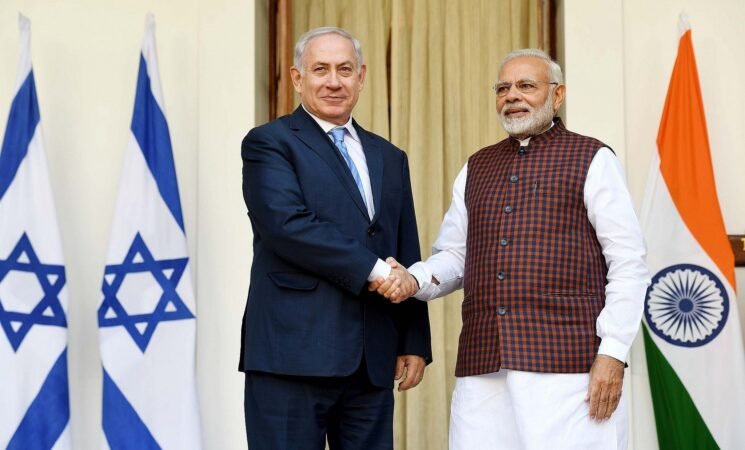27 May 2021, NIICE Commentary 7031
Nidhi Goswami
T S Tirumurti, India’s permanent representative to the United Nations, on 17 May 2021 delivered a cautiously drafted statement during the United Nations Security Council ‘open debate’ on the then ongoing series of violent exchanges between Israel and Palestine. In a statement that reiterated India’s firmness on the two state solution to the issue of Israel and Palestine and its condemnation of violence triggered at the outset in East Jerusalem by Israeli forces, Tirumurti’s statement did manage to surprise many scholars and policy makers who have closely observed India’s evolving affability with the state of Israel in recent years. The statement put forth India’s resolve towards pragmatically striking a balance between the two sides keeping in view traditional and contemporary international realities. After New Delhi’s apparent de-hyphenation of its relations with Israel and Palestine since PM Modi came to power, the recent statement in the Security Council substantiates that India will continue to maintain its balancing posture with regard its Israel and Palestine policy.
What Triggered the Conflict?
The violent exchanges of rockets and bombings between Hamas from Gaza and the Israeli forces could be called the final showdown in a series of disturbing events that began April this year. From the entry of Israeli forces inside Al-Aqsa during the month of Ramadan in April to cut out prayer sounds from the loudspeakers, to the Israeli police decision to close a plaza at the gates of the old city of Jerusalem where Palestinian youth typically gathered during the month of Ramadan, the events prepared a wet ground for the ensuing conflict. Additionally, the crackdown inside the Al-Aqsa mosque again in the first week of May ahead of a Zionist march (to commemorate victory over Jerusalem in 1967) and apprehensions of a pending court decision leading to eviction of 6 Palestinian families from the Al Jarrah neighbourhood in East Jerusalem fueled the tensions further. The first rockets were fired from Gaza on 10 May that led to airstrikes by the Israeli forces.
As the conflict escalated during the week, the world watched in anticipation. Narratives and counter-narratives started doing the rounds on social media with ‘hashtag wars’ breaking out on twitter. The Indian public opinion seemed divided on the issue with vehement support for either side, although widespread outrage against Hamas poured out on social media when one of its rockets killed an Indian caregiver in the Israeli city of Ashkelon. In a conflict that lasted eleven days, before a ceasefire was declared, it had claimed lives of many civilians on both sides, injuring hundreds.
Examining India’s Statement at the United Nations Security Council
Tirumurti’s statement in the United Nations Security Council ‘open debate’ is a significant one, firstly it was the first statement of India on the issue since the conflict began and secondly it underlines India’s official position of a ‘two-state solution’ to the issue.
The statement at the very outset, implied Israel to be at the bottom of triggering the series of violence by tracing the origin of the conflict to East Jerusalem (and not Gaza). It also informed the council of its concern over the changes that Israel was undertaking in East Jerusalem regarding the eviction of Palestinians from the Sheikh Jarrah and Silwan neighborhood, against the UN mandate. It’s appeals to both conflicting sides to “observe extreme restraint, desist from action that exacerbate tensions and refrain from actions that unilaterally change the existing status quo including in east Jerusalem” was a clear message to Israel against its policy of building settlements inside the disputed territory. The statement highlighted India’s unwavering support to the “just” Palestinian cause and a two-state solution, therefore retaining its traditional position on the issue.
The balancing posture of India, however, was evident with coupling of Haram Al Sharif with Temple Mount through the recurring reference in its statement. Haram Al Sharif and Temple Mount are places of worship for Muslims and Jews respectively that are located in the city of Jerusalem. Administered by Jordan, Jewish worshippers have traditionally not been allowed to offer prayers at the site despite their protests. By acknowledging Temple Mount, India has equated Jewish claims along with those of Muslims. The hyphenation of Haram al Sharif/ Temple Mount at the Security Council statement displays a clear shift in India’s position over the city of Jerusalem that previously endorsed solely the Islamic claims over the city of Jerusalem without acknowledging any Jewish claims. This has a huge bearing on India’s relations with Israel as it cements Jewish claims over Temple Mount.
Also significant was the absence of any reference to East Jerusalem as the capital of Palestine which has now become a familiar trend even when India has been traditionally reiterating its support for a “sovereign, independent, united and viable Palestine” on various occasions. The statement also condemned the “indiscriminate” firing of rockets from Gaza that was targeted towards the civilian population in Israel while the Israeli airstrikes were termed as just “retaliatory” and there was no explicit reference to the inordinate bombing attacks from the Israeli side.
To observers in the international community, India in the last few years under Prime Minister Narendra Modi is said to be gravitating towards Israel with deepening cooperation among the two, across sectors of defence, security, science and technology, and agriculture. However, a balanced and well-measured statement at the Security Council a few days ago, displayed India’s flair for engaging both Israel and Palestine in a now de-hyphenated relationship, offering support to peaceful resolution of conflict through a ‘two-state solution’. The statement was a cautiously crafted mixture of the old and the new with continuity in its historical policy position on one hand, and a glaring change in the traditional terminologies used on the other . However, given the uncertainty in international politics, sustaining such a balance would demand constant evolution.

